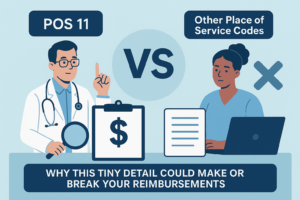The main reason for denials in behavioral health is a lack of understanding of how insurance reimbursement works. If you are working in a behavioural health setting, then you must deal with the claims denials that are always frustrating for everyone. Providers always want to avoid this headache but it has become one of the most common challenges in this field. And if we analyse, then behavioral health claims tend to be denied at a higher rate compared to other specialties. Denials are not just about frustration, but it has severe impacts on the overall performance of practices. They don’t just slow down cash flow—they can drain staff energy, hurt patient satisfaction, and even affect a practice’s financial stability.
As an experienced medical billing company, M&M Claims Care understands this, as we’ve relieved a large number of mental health practices from these denials with our proven strategies.
So let’s discuss why denials occur so frequently in behavioral health, what they really cost providers, and what you can do to prevent them with effective strategies.
Why Behavioral Health Claims Get Denied So Often
Research shows that claim denials have increased 10-15% across all healthcare practices. And there are different reasons behind these denials, from changing payer rules, unique coding requirements, to tricky authorization processes.
Authorization Issues
This is probably the major reason for denials. Many behavioral health billing services, long-term therapy sessions, psychological testing, and substance use treatments require prior authorization. Miss that step or fail to renew authorization on time, and your claim could be dead on arrival, no matter how accurate your other steps are
For example, a patient might need 20 therapy sessions, but the insurance company only approves 10 upfront. If the provider forgets to request additional visits before continuing treatment, claims for sessions 11 through 20 could all get denied.
Coverage Limitations
Behavioral health benefits can vary widely depending on the plan. Some policies limit the number of visits per year, others exclude certain types of therapy, and many impose strict rules around telehealth coverage. Submitting claims for services outside the plan’s coverage will almost always trigger a denial.
Coding Errors
Behavioral health coding isn’t always straightforward. CPT and ICD-10 codes have to align perfectly with the service provided, the diagnosis, and the payer’s requirements. Even small mistakes like using an outdated code or forgetting a required modifier can cause a claim to bounce back.
For example, a provider bills CPT 96156 for health behavior assessment but mistakenly pairs it with a diagnosis code for major depressive disorder, which the payer doesn’t recognize as appropriate for that procedure. The claim is denied for an invalid diagnosis/procedure code pairing (Denial Code: CO-11).
Incomplete or Inaccurate Documentation
Insurance companies are sticklers for documentation, especially when it comes to behavioral health. If a patient’s chart doesn’t clearly show medical necessity, if progress notes are missing, or if signatures are absent, payers can reject the claim.
For example, a patient is approved for 10 outpatient therapy sessions but continues treatment without renewing authorization. The claim for the 11th session (CPT 90834) is denied for lack of prior authorization (Denial Code: CO-197).
Coordination of Benefits Problems
Sometimes patients have more than one insurance plan, like through an employer and Medicaid. If the claims aren’t submitted to the correct payer in the right order, they’ll almost certainly get denied.
For example, a patient has both employer-sponsored insurance and Medicaid. The provider submits the claim to Medicaid first. Medicaid denies it for COB, stating that the primary insurance must be billed first (Denial Code: CO-22).
Timely Filing Issues
Every payer has its own deadline for claim submission, mostly from 90 to 180 days. Miss the window, and no matter how correct the claim is, it’s denied automatically.
For example, a claim for a therapy session (CPT 90832) is submitted 120 days after the date of service, but the payer’s timely filing limit is 90 days. The claim is denied for late submission (Denial Code: CO-29).
The Real Cost of Denied Claims
Denied claims aren’t just annoying but they’re expensive. Industry studies estimate that reworking a single denied claim can cost a provider anywhere from $25 to $118 in administrative time and resources. And that’s if you even bother to rework it. Many providers don’t.
Think about it that if a behavioral health practice has a 10% denial rate and submits 1,000 claims a month, that’s 100 claims denied. Even if only half of those are eventually corrected and paid, that’s still a significant chunk of revenue lost forever.
And if we talk beyond these dollars, then denials can create other problems:
- Delays in patient care: If services need re-authorization or correction, then patients can experience gaps in treatment.
- Staff burnout: Constantly chasing down payers, fixing claims, and appealing denials takes valuable time of staff.
- Strained patient relationships: When insurance doesn’t pay, patients get frustrated and start blaming the provider.
How to Prevent Denied Claims in Behavioral Health
Most denied claims are preventable. With the right strategies, you can cut your denial rate like M&M Claims Care does and keep your revenue cycle running smoothly. Let’s see some proven strategies:
Verify Patient Eligibility and Benefits Upfront
Never assume coverage. Always check eligibility before the first appointment and again periodically if treatment is ongoing. Pay close attention to:
- Visit limits
- Copays and deductibles
- Authorization requirements
- Telehealth rules if applicable
At M&M Claims Care, we often find issues during eligibility checks that would have led to denials. A five-minute verification call can save weeks of appeals.
Get Authorizations Right the First Time
If prior authorization is required, submit it early and track the approval closely. Document authorization numbers in the patient’s chart and billing system. And don’t forget to renew authorizations before they expire.
A good practice is to set up reminder alerts for when authorizations are about to run out. That way, you’re not scrambling at the last minute or losing reimbursement for services already provided.
Code with Precision
Behavioral health coding has its own challenges, so it’s critical to stay current with CPT and ICD-10 updates. Use codes that clearly establish medical necessity and always double-check that diagnosis and procedure codes line up.
For example, a claim for psychotherapy (90837) without a corresponding mental health diagnosis code may get denied. Pairing services with accurate, payer-accepted diagnoses reduces that risk.
Document Thoroughly and Consistently
Documentation isn’t just for compliance but it’s your best defense against denials. Make sure all notes:
- Show a clear medical necessity
- Match the billed services and time spent
- Include signatures and dates
- Support the frequency and duration of treatment
Some payers even audit therapy notes to ensure time and service levels align with the claim. If your documentation is solid, you’re on safe ground.
Submit Claims Promptly
Don’t let claims sit too long before submission. Create internal deadlines that are stricter than payer requirements. For example, if the payer allows 90 days, set your practice rule at 30 days. That way, even if delays happen, you’re still in the safe zone.
Use Technology to Your Advantage
Claim scrubbing software, electronic health records (EHRs), and automated alerts can all reduce errors. Many new software programs are introduced to find coding mistakes or missing information before the claim is sent, preventing avoidable denials.
Track and Analyze Denials
The main goal is not just to correct denials, but it’s about tracking them. Look for patterns. Are most of your denials coming from one payer? One type of service? One provider’s documentation? By analyzing trends, you can fix systemic issues instead of putting out fires one at a time.
Partner with a Billing Specialist
Behavioral health billing is specialized. Outsourcing to experts like the team at M&M Claims Care can handle it more efficiently. We know the ins and outs of payer policies, we stay on top of updates, and we manage denials with a proactive approach so providers can focus on patient care.
Outsource Your Behavioral Health Billing and Focus on Patient Care
Denials are part of behavioral health but practices do not always need to survive with this headache. With a proactive approach—eligibility checks, accurate coding, thorough documentation, and the right billing partner like M&M Claims Care, you can keep your denials to a minimum and revenue flowing smoothly. Outsource your medical billing services to M&M Claims Care, which specializes in helping behavioral health providers take control of their revenue cycle. We understand that the key to building a financially healthy practice is not just fixing a denial but it is more about preventing them. Choose M&M Claims Care, your best medical billing partner, if you want to stop fighting insurance companies and start getting paid what you deserve.







